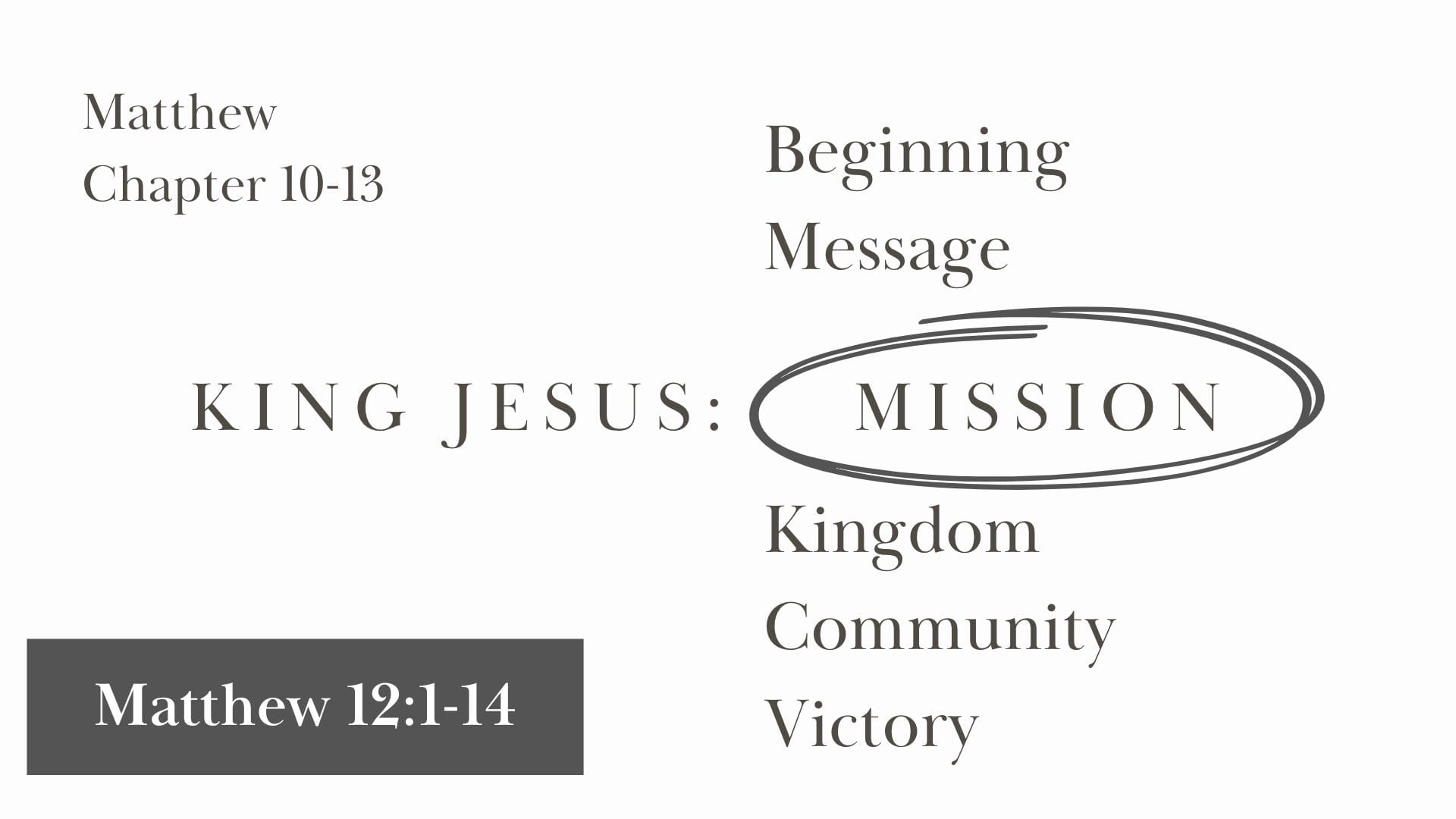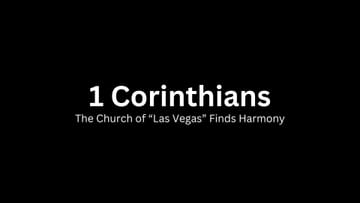Text:
At about that time Jesus was walking through some grainfields on the Sabbath. His disciples were hungry, so they began breaking off some heads of grain and eating them. But some Pharisees saw them do it and protested, “Look, your disciples are breaking the law by harvesting grain on the Sabbath.” Jesus said to them, “Haven’t you read in the Scriptures what David did when he and his companions were hungry? He went into the house of God, and he and his companions broke the law by eating the sacred loaves of bread that only the priests are allowed to eat. And haven’t you read in the law of Moses that the priests on duty in the Temple may work on the Sabbath? I tell you, there is one here who is even greater than the Temple! But you would not have condemned my innocent disciples if you knew the meaning of this Scripture: ‘I want you to show mercy, not offer sacrifices.’ For the Son of Man is Lord, even over the Sabbath!” Then Jesus went over to their synagogue, where he noticed a man with a deformed hand. The Pharisees asked Jesus, “Does the law permit a person to work by healing on the Sabbath?” (They were hoping he would say yes, so they could bring charges against him.) And he answered, “If you had a sheep that fell into a well on the Sabbath, wouldn’t you work to pull it out? Of course you would. And how much more valuable is a person than a sheep! Yes, the law permits a person to do good on the Sabbath.” Then he said to the man, “Hold out your hand.” So the man held out his hand, and it was restored, just like the other one! Then the Pharisees called a meeting to plot how to kill Jesus.
As we follow Jesus, He EMPOWERS us to MAKE A DIFFERENCE.
Overall Commentary: 🌎
In our previous entries, we have finished walking with Jesus as He has gathered the crowds, refocused their attention, and reasserted the mission. Now we see Jesus entering into the world again with His disciples. Matthew does not always let us know how much time has passed. It is likely it's been several days or weeks, and the twelve disciples are back with Him again. It is also possible it was the twelve that were 'caught' eating the grain. Watch how Jesus goes deeper than the surface-level confrontation to what is really going on. Then, watch Jesus show us what love in action looks like.
As we follow Jesus, He restores OUR JOY as we DISCOVER HIS WORD.
On the surface, it looks as though the Pharisees are simply wanting Jesus' disciples to obey one of the biggest commands of the Old Testament. All the way back to Mt Sinai, God told Moses to give the recently freed nation of Israel one day of rest out of seven. The thing is, though, the sabbath was not just about rest. It was about fellowship with God. It was about trusting in God. It was about the peace we gain from knowing God is for us and is working when we are not. This is an awesome promise the nation of Israel was reminded of every seven days. The problem is the controversy over what constituted work and rest had become a major debate since the time of Ezra. The nation of Israel had taken what was once a celebration and had turned it into a burden. They imposed over 39 different sets of rules in order to make sure you did not violate the sabbath 'rest.' Over the years, just before Jesus, it had become increasingly more ridiculous to the point that you could not carry your coat from room to room because it was considered 'work.' You had to wear the coat so you were not 'laboring.' Jesus is not upset with their desire to keep the Sabbath day holy. He is upset at their loss of the joy of what the day was about. This is the difference between legalism and relationship.
Legalism vs. Relationship- Legalism says I must do the right things so that I can be accepted by God. Relationship says I get to do the right things because I am accepted by God.
Jesus explains the way back to having the right understanding and He uses His Word to do it.
Commentary
Verse 1-3: The confrontation.
The Pharisees are striking up an old argument concerning what constituted 'work' on the Sabbath. It is true that no work was to be done, and it was considered a day of rest. However, the Torah left these phrases open for interpretation so there could be freedom within boundaries. The Jewish teachers created what is called the 'oral law' or Talmud and Misha. In these commentaries, they created guidelines that place various restrictions on open-ended commands. This led to over 39 different sets of rules so you didn't violate the Sabbath. It included not being able to spit on the ground, not carrying a coat, and you could not walk further than 1,000 yards. They had lost the point of the day set aside to fellowship with the Lord.
- Breaking off heads of grain: This was NOT stealing. The sides and corners of the fields were left unharvested for something like what the disciples were doing. People passing through, foreigners, beggars, and those who needed it were allowed to have all that was purposefully left behind.
- Sabbath: 4th commandment. Intended to teach a slave nation how to rest and trust the Lord.
- Pharisees- the most devout religious sect within the Jewish religion.
Verse 3-4: Joy grows as we discover the principles of His Word.
Jesus begins to teach them how to get back to seeing God's Word for what it is and not as a legalistic document of judgment.
- Have you not read: Jesus is not asking if they have ever read the Old Testament. He is asking if they have not understood the purpose of the Old Testament.
- Scriptures: The Old Testament, specifically the first 5 books. This is also known as the Torah.
- David and His Companions: 1 Samuel 21
- Sacred loaves: Every seven days, the priests were required to bake fresh bread and present it before the Lord in the Tabernacle. At the end of the seven days, the bread was replaced and the priests could eat the bread. This bread was supposed to be eaten by the priests. However, it was given to David in a moment of need.
Verse 5-6: Joy grows as we discover the context of His Word.
Jesus uses the Word again to point out that the Sabbath can work differently for different people for different reasons. It requires reading the context of Scripture and not just picking out certain verses in order to get the full scope of what God's Word is trying to say.
- Law of Moses: The first five books of the Old Testament.
- Priests on duty: There were many priests, and not all were needed at the same time. Because of this, different priests would be called upon to take turns in serving the needs of the Tabernacle.
- Greater than the Temple: Jesus is pointing to Himself and giving His authority for why they were able to do what they were doing on the Sabbath. It was because the King was with them.
Verse 7-8: Joy grows as we discover the heart of God through His Word.
Jesus shows them to truly understand the heart of God, we find it in His Word. This illuminates what we are to do most of the time.
- I want you to show mercy, not offer sacrifices: Quotation from Hosea 6:6. Jesus is telling them not to forget the goal of sacrifices was not to kill animals. The goal of sacrifices was to find mercy.
- Son of Man- Messianic title from the Old Testament book of Daniel.
What can we learn from this passage?
The first half of this passage is a lesson in what scholars call hermeneutics. Hermeneutics is the study of Biblical interpretation. It is important to interpret the Bible correctly because it is through His Word that He primarily reveals Himself.
In the second half of this passage, Jesus shows us love in action. As we follow Him and truly see Him, He shows us how to see others. In the passage, we see what happens when we get caught up in religious legalism. The Pharisees did not see a man in need of help. They saw a man they could exploit. They attempted to use him to corner Jesus. They were technically correct according to their traditions. Their traditions said you were not to administer medical attention or healing to anyone on the Sabbath. The only exception was if they were dying. This man was not dying so he was not supposed to be healed. Jesus points out their hypocrisy by showing how they give exceptions to less important things. He does not see a legalistic rule. He sees a man to be loved. This is how we see others when we rediscover the joy of knowing God through knowing His Word.
Questions/Journal Prompts for reflection:
- Do you consistently read God’s Word? Why or Why not?
- Have you ever struggled with thinking you have to earn God’s love?
- Why do you think people tend to struggle with legalistic tendencies?
- After today’s message, what is your next step?









